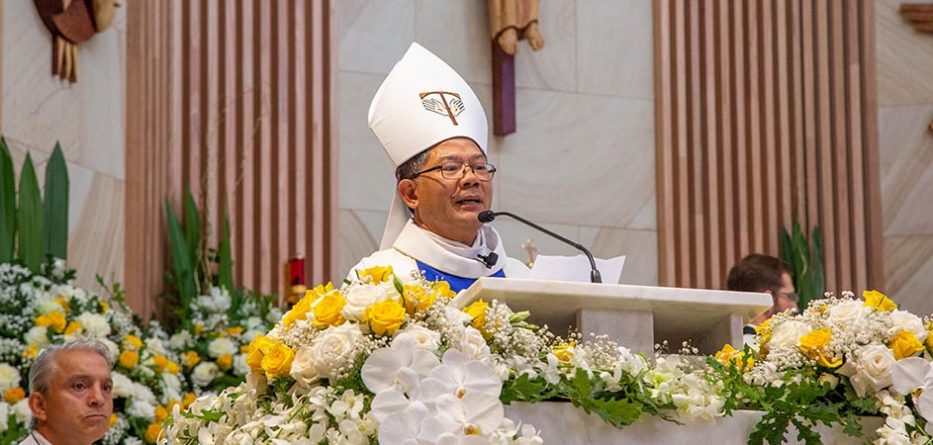Most Reverend Vincent Long Van Nguyen OFM Conv DD STL, Bishop of Parramatta
Homily for the 3rd Sunday in Ordinary Time Year A 2020 at St Bernadette’s Parish, Lalor Park
Readings: Isaiah 8:23-9:3; 1Cor 1:10-13,17; Matt 4:12-23
26 January 2020
Called to embody God who gathers all together
Sisters and brothers,
This long weekend, we celebrate Australia Day, which in the light of our conflicted past should bring us together in the spirit of humility and reconciliation. As Christian Australians, we can both celebrate the good things we love about our nation, as well as recognise the wounds that need to be healed in the land and its people.
European settlement changed Australia. But we realise, too, that the descendants of the early settlers are all the richer and stronger with our first and our new Australians together. It is time for us to grieve with our Indigenous brothers and sisters who are often left disadvantaged in so many ways. In the aftermath of the devastating bushfires, we should also acknowledge the ancient wisdom of their culture that values its relationship with the natural world, a culture that is tied to the care of the land and its flora and fauna. The Western culture with its emphasis on technology, profit and consumption may not serve us well going forward without the ancient Indigenous wisdom.
Scriptures on this third Sunday in Ordinary Time speak to us about hope in the time of pain and darkness. The God of our ancestors in faith does not shield us from the ebbs and flows of history. But neither does He remain unmoved by our changing fortunes. He leads us and empowers us to move beyond our fears to live a life of faith, hope, love and service. In Jesus, He calls us and forms us into living embodiment of the God who cares for His people.
In the first reading, we hear a hopeful message from the prophet Isaiah who ministered during a very tumultuous time in Israel’s history. The golden era of David and Solomon was over. Israel became a house divided and a pawn for much more powerful kingdoms such as Babylon, Assyria and Persia. The small tribes of Zebulun and Naphtali, which occupied the northern edges of Israel were the first to fall to these foreign forces. They were presumed lost and forgotten.
But in God’s scheme of things, no one and especially no one who is insignificant should be lost and forgotten. This is the underlying message of Isaiah. Against the background of imperial domination where it matters to be powerful, the prophet speaks of a God who pays attention to the weak. Zebulun and Naphtali are not forgotten. They, the least of the tribes of Israel who have been humbled in the exile, will be restored to honour. Isaiah addresses a message that has become familiar to us at Christmas time: “The people who walked in darkness have seen a great light; those who lived in a land of deep darkness – on them a light has shone.” This is no pie-in-the sky stuff. This is the perennial call to faith because evil and injustice do not have the last word. The restoration of His faithful remnants remains God’s unshakeable covenant throughout the ages.
In the Gospel story, we see the fulfilment of Isaiah’s prophecy through the actions of Jesus. It tells us of how he goes about proclaiming the reign of the Kingdom and acting in favour of that Kingdom despite the rampant presence of evil. John’s arrest should have served as a warning to him. Yet instead, it was a catalyst for Jesus’ full immersion into a life of service and witness. Jesus refused to sit back and allow sin, evil, injustice, and oppression to crush humanity. He went to those places that Isaiah foretold and fulfilled the prophecy concerning the hopes of the oppressed people. He called the Twelve Apostles who represented the Ttwelve Tribes of Israel. He was the embodiment of the God who came to restore what was lost.
Sisters and brothers,
We live in a time, which in many ways is not unlike that of God’s people in exile. In recent weeks we have had a bitter foretaste of the effects of climate change and the lack of a resolute policy to address the roots of the ecological crisis. We must have the courage to move to the new future where God beckons instead of holding onto the past for fear of change. The present crisis can be turned into new horizons of possibility, for us but also beyond us, to future generations and to the world that God loves. We cannot afford to go back to business as usual in the light of the crying need for a sustainable future.
We are the people who have seen the great light of Christ. We are called like the disciples of Jesus to witness to the Kingdom, that is an antithesis and an alternate reality to the imperial model of domination and oppression. In a world of darkness and despair, we are called to be the living embodiment of God’s love that is stronger than hatred. We are called to restore what was lost and gather what was scattered. May the celebration of Australia day move us to heal the wounds of our past, to bring justice our present and prosper our future. May we follow the footsteps of Jesus who proclaimed the Good News of the Kingdom and cure the diseases among the people. May our missionary discipleship help bring about the transformation of the world.








